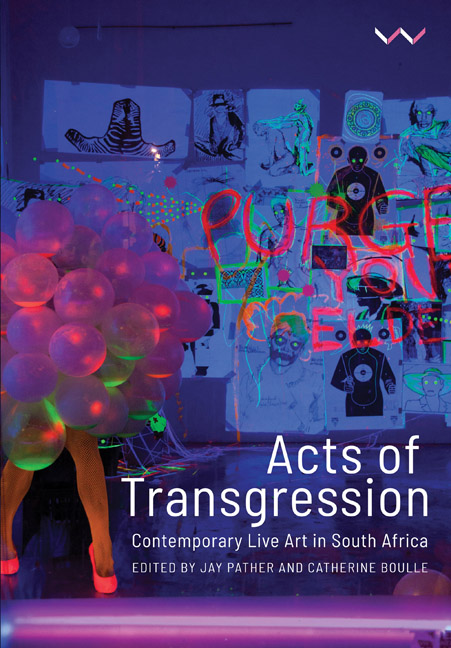Book contents
- Frontmatter
- Contents
- Acknowledgements
- Introduction
- PART ONE LIVE ART IN A TIME OF CRISIS
- PART TWO LOSS, LANGUAGE AND EMBODIMENT
- 5 Corporeal HerStories: Navigating Meaning in Chuma Sopotela's Inkukhu Ibeke Iqanda through the Artist's Words
- 6 ‘A Different Kind of Inhabitance’: Invocation and the Politics of Mourning in Performance Work by Tracey Rose and Donna Kukama
- 7 State of Emergency: Inkulumo-Mpendulwano (Dialogue) of Emergent Art When Ukukhuluma (Talking) is Not Enough
- 8 Space is the Place and Place is Time: Refiguring the Black Female Body as a Political Site in Performance
- PART THREE RETHINKING THE ARCHIVE, REINTERPRETING GESTURE
- PART FOUR SUPPRESSED HISTORIES AND SPECULATIVE FUTURES
- Contributors
- List of Illustrations
- Index
7 - State of Emergency: Inkulumo-Mpendulwano (Dialogue) of Emergent Art When Ukukhuluma (Talking) is Not Enough
from PART TWO - LOSS, LANGUAGE AND EMBODIMENT
Published online by Cambridge University Press: 30 May 2019
- Frontmatter
- Contents
- Acknowledgements
- Introduction
- PART ONE LIVE ART IN A TIME OF CRISIS
- PART TWO LOSS, LANGUAGE AND EMBODIMENT
- 5 Corporeal HerStories: Navigating Meaning in Chuma Sopotela's Inkukhu Ibeke Iqanda through the Artist's Words
- 6 ‘A Different Kind of Inhabitance’: Invocation and the Politics of Mourning in Performance Work by Tracey Rose and Donna Kukama
- 7 State of Emergency: Inkulumo-Mpendulwano (Dialogue) of Emergent Art When Ukukhuluma (Talking) is Not Enough
- 8 Space is the Place and Place is Time: Refiguring the Black Female Body as a Political Site in Performance
- PART THREE RETHINKING THE ARCHIVE, REINTERPRETING GESTURE
- PART FOUR SUPPRESSED HISTORIES AND SPECULATIVE FUTURES
- Contributors
- List of Illustrations
- Index
Summary
When the emotion becomes too strong for speech, you sing, when it becomes too strong for song, you dance.
Unattributed musical theatre proverbFor as we begin to recognize our deepest feelings, we begin to give up, of necessity, being satisfied with suffering and self-negation, and with the numbness which so often seems like their only alternative in our society. Our acts against oppression become integral with self, motivated and empowered from within.
Audre Lorde, Sister Outsider: Essays and Speeches‘I can't believe I still have to protest this shit,’ read a popular sign at the Women's March in Washington DC on 21 January 2017 – the first full day of Donald Trump's presidency. In South Africa, one of several mass marches calling for the resignation of then President Jacob Zuma before the end of his full term was held on 12 April 2017. A signal of this same feeling could be seen on a protester's placard stating, ‘Not this shit again.’ These emotions are carried by a force of enough-is-enough in response to the repetition of acts of aversion by the presidents of both the United States and South Africa. Both presidents were accused of sexual assaults prior to taking office. ‘This shit’ indicates disgust – an emotion that covers a wide spectrum of feelings from revulsion at expired food to moral abhorrence. In The Book of Human Emotions, Tiffany Watt Smith describes disgust as a liminal emotion that occurs ‘when boundaries dissolve, meaning breaks down and things slide “out of place.”’ Disgust is the response of a subject who is not able to make sense of events. Emotions ‘are meaningful contributions to the way one understands the world. Our emotive behavior represents the choices one makes when confronted by extreme situations.’ Emotion generates a space akin to postcolonial theorist Homi K. Bhabha's notion of ‘the “third space” which enables other positions to emerge … which are inadequately understood through received wisdom.’ For Jean-Paul Sartre, emotion is a means to apprehend the world and transform it by changing the self.
Emotion is the knowledge of things not fitting. It alters space for the creation of new knowledge, as Sara Ahmed suggests in her performative thesis Living a Feminist Life: ‘Think of this: how we learn about worlds when they do not accommodate us.
- Type
- Chapter
- Information
- Acts of TransgressionContemporary Live Art in South Africa, pp. 148 - 168Publisher: Wits University PressPrint publication year: 2019

